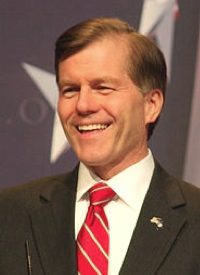
The Republican Party of Virginia will require all citizens of the state voting in the Republican primary on March 6, 2012 to sign a loyalty oath before being permitted to cast their votes. Put plainly, anyone who shows up at the polling place must sign a form wherein he or she swears to support the Republican candidate who wins the nomination. Refusal to sign the pledge results in revocation of the right to vote in the Republican primary election.
Local media reports that, During a brief meeting Wednesday [December 28] at the state Capitol, the State Board of Elections voted 3-0 to approve three forms developed by the election boards staff to implement the loyalty pledge requested by the state GOP.
This rather radical requirement invokes several questions of constitutionality.
First, the decision to make the loyalty oath a non-elective qualification for voting triggers a 14th Amendment analysis.
The threshold question, then, is whether this decision on the part of the Republican Party of Virginia qualifies as state action.
It would seem that it does. According to the decisions handed down by the Supreme Court in Smith v. Allwright, 321 U.S. 649 (1944) and Terry v. Adams, 345 U.S. 461 (1953), political parties are not private clubs and any action taken by them that affects the right to vote is subject to scrutiny under the 14th Amendment.
In the cases cited above, the Court held that any attempt by a political party to restrict access to primary elections had the potential to abridge the 14th Amendments guarantee of the equal protection of the laws to all citizens.
The second legal hurdle that must be cleared by the Republican Party of Virginia’s effort to control access to the voting booth is pre-clearance of such a scheme by the Department of Justice.
The requirement that the Department of Justice review (or examine, to use Attorney General Holders word) proposed changes to the procedures implemented by the states to qualify voters is called pre-clearance.
Section 5 of the Voting Rights Act sets forth the pre-clearance mandates.
Specifically, this provision of the law establishes an administrative procedure by which the DOJ must pre-approve any law attempting to alter any voting qualification or prerequisite to voting, or standard, practice, or procedure with respect to voting within a covered jurisdiction.
With regard to the interpretation of key terms in that section, the Supreme Court defined “any voting qualification or prerequisite to voting” very broadly in its decision in the case of Allen v. State Board of Election, 393 U.S. 544 (1969). Basically, the holding affords great latitude to the federal overseers, allowing them to dissect every revamped voting regulation, regardless of the rationale that precipitated its passage.
In order to implement any such change, a covered jurisdiction must receive pre-clearance either from the Attorney General or the U.S. District Court for the District of Columbia. In order to obtain this permission, the state must prove that the new law does not discriminate between voters based on race or color and that it was not enacted for such a purpose.
After receiving the petition from a covered jurisdiction, the Justice Department has 60 days to respond. If the state (or other jurisdiction) enacts the proposed change in defiance of the DOJ’s denial of pre-clearance, then it must immediately cease enforcement of the offending provisions or enact another change and start the pre-clearance process afresh.
All but 14 of the 95 counties in the Old Dominion are included in the list of covered jurisdictions.
The foregoing description of Section 5 of the Voting Rights Act should make clear that such federal checks on the right of states to set their own standards for suffrage are not constitutionally sound and not supported by this writer.
That said, however, as of December 28, the Voting Rights Act (including Section 5 which would seem to apply to the case of the Republican Party of Virginia’s loyalty oath) is the law of the land and until it is repealed its applicable provisions must be heeded.
Again, the particulars of the procedures set forth by the Republican Party of Virginia to assure adherence to the new voter qualification were reported by local media:
Signs for polling places and the pledge form will advise voters that Section 24.2-545 of the Code of Virginia allows the political party holding a primary to determine requirements for voting in the primary, including the signing of a pledge by the voter of his intention to support the party’s candidate when offering to vote in the primary.
The pledge will require the voter to sign and to print his name beneath a line that says: I, the undersigned, pledge that I intend to support the nominee of the Republican Party for president.
In Virginia’s 2000 GOP presidential primary, won by Texas Gov. George W. Bush, voters were required to sign a different pledge: I, the undersigned, state that I do not intend to participate in the nomination process of any other party than the Republican Party.
Upon learning of his party’s decision to demand the signing of such a pledge, Virginia Delegate Bob Marshall voiced his objection. In a statement circulated throughout Virginia, Marshall explained the reason for his opposition to the imposition of the loyalty oath requirement:
Ironically, requiring a loyalty oath will bar even former U.S. House Speaker Newt Gingrich from voting in the primary. Because he already has said unequivocally that he will not vote for Ron Paul for President if he’s the Republican nominee.
Virginia’s Republican leadership wants to mandate a loyalty oath when Virginia’s Republican officials are in court fighting the Obamacare mandate? This sends the wrong message.
I understand Republican leaders not wanting Democrats to make our decision for us, but a loyalty oath is not the way to address that circumstance. Requiring Virginia election workers to enforce a Republican loyalty oath in a primary paid for by the general taxpayer is a markedly questionable use of tax money.
Republicans I know want to defeat President Obama and his liberal Democrat supporters in Congress. I believe the great majority will vote for the Republican nominee over Obama. I question whether beating Barack Obama, which I am working hard to do, is furthered by requiring a loyalty oath in this presidential primary.
Perhaps unintentionally, Marshall may have hit on the underlying motivation for the drafting of the loyalty oath in the first place.
Ron Paul (who’s name will appear at the top of the Republican primary ballot in Virginia as a result of a drawing held by the State Board of Elections) is running for President as a representative of the Republican Party, but his views on foreign aid, foreign wars, abolishing the Federal Reserve, and restoring states rights place him outside of the central channel of the mainstream of Republican Party policy. If Paul were to go on a tear through the primaries preceding the one in Virginia, there may be a fear that independents would line up to cast votes for the Texas Congressman in the Republican primary, thus denying the states delegates to Mitt Romney (the only other Republican on the ballot after the other GOP hopefuls failed to submit the requisite number of signatures).
Were Paul to win, the theory goes, the bloc of independents that voted for him in the primary election would abandon him in November and throw their support behind Barack Obama (or a third party candidate), thus effectively nullifying Virginia’s Republican primary.
A Quinnipiac University poll conducted on December 19, 2011 shows Ron Paul trailing Mitt Romney among those likely to vote in the March 6 primary assuming they will still qualify to do so.
Photo: Virginia’s Republican Governor Bob McDonnell



